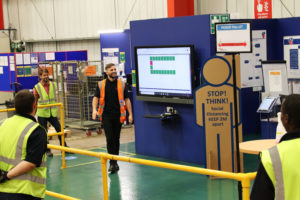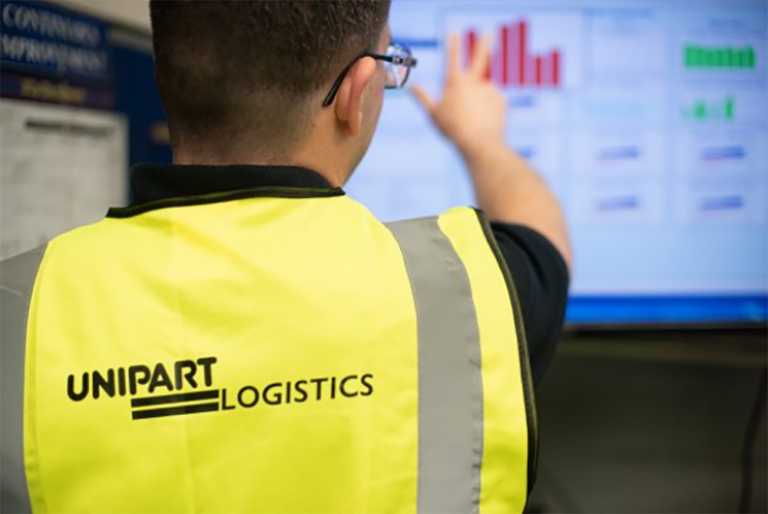Drawing on the agility and expert best practices embedded within Unipart’s approach – known as the ‘Unipart Way’ – NHS Supply Chain has ensured the needs of NHS trusts, frontline workers and patients have been prioritised
As a key service provider to the NHS Supply Chain, Unipart Logistics has risen to the challenge of protecting both its people and its processes during the uncertainties of a global pandemic.
The company, a sponsor of the 25th Supply Chain Excellence Awards taking place on 8th November, helps to manage, source, deliver and supply more than 4.5 million orders a year for NHS trusts and healthcare organisations across England and Wales. With the onset of Covid-19, logistics activity peaked as colleagues worked day and night, seven days a week, to provide vital products to frontline NHS staff.
Unipart also ensured products such as sharps bins, wipes and paper towels were immediately available for the launch of the UK vaccination programme in December 2020, and continues to support trusts and vaccination sites with logistics and customer services support.
Putting people first
Unipart Logistics’ use of digital technologies for auditing and trend analysis had been expanding before the pandemic to strengthen the whole health and safety management system, improve processes, reduce risk, and increase behavioural compliance.
Ensuring continuous improvement helped best practice nto be shared quickly, using tools such as Communication Cells. These powerful information portals provide teams with up-to-the minute business data vital for day-to-day activity. They make it possible for teams to meet virtually anywhere across the globe, and review performance data in real time, working together to solve problems and access important news and information.
None of this would have been possible without a proactive and fully comprehensive approach to workforce health and safety, minimising any disruption to resourcing, even at the height of the pandemic, and supporting colleagues across the Unipart business.
In fact, safety levels within NHS Supply Chain’s logistics arm are at an all-time high under Unipart’s management. In every industry, the pandemic brought about the need for far-reaching changes in processes, structures, norms and policies – and a need for these changes to be delivered at a pace that few would have thought possible just months before.

Within Unipart, maintaining people’s well-being and introducing work-from-home policies for certain roles had to be balanced with increasing supply chain demands on the NHS, and other clients such as Sky and Waterstones, and the importance of stepping-up service delivery and product flow.
Introducing effective, agile changes was only half the battle. These changes also had to be embedded and clearly communicated in an environment in which government guidelines were constantly evolving.
The Unipart Way
Unipart was able to keep delivering for customers because it had set out the safest working conditions to protect employees, based on its industry-leading approach to health and safety, borne out of the ‘Unipart Way’ approach that optimises employee engagement and productivity.
Unipart acted early and decisively to implement ‘Covid-19-secure’ working in its DCs, by launching social distancing, handwashing, physical cleansing and protective workwear as the standard for all operations.
In some cases, this meant changing the habits of a lifetime for people who had been working closely, side-by-side for many years. But an extensive communications plan, coupled with clear floor markings, visual reminders and consistent employee engagement, made all the difference. An online tool, the Social Distance ‘S’, is used by teams every day to capture their experience and audit the way in which safety standards are being used, particularly around social distancing. Unipart also ‘takes the emotional temperature’ of teams through surveys, acting on the insight gathered to make continual improvements.
The greatest asset
Unipart’s capability to embrace and adapt to change came to the fore during the pandemic and was appreciated and embraced by the wider public as part of the NHS Supply Chain’s Covid response.
The measures taken by Unipart Logistics to support the NHS Supply Chain meant clear policies and structures were backed up by accurate and consistent communications. “In terms of changing processes, Covid taught us you can operate faster, smarter and leaner than many think is possible by getting people to buy into what you are doing,” says Chris Taylor. “Unipart’s passionate leaders and our proven management systems demonstrate world-class health and safety. Rightly, it is top of our agenda because every person is valuable, every voice counts and people are our greatest asset.”
Looking at health and safety through a digital lens enables Unipart to use technology to identify risks and share the information almost instantly. Digital technology has advanced Unipart’s health and safety excellence across all Unipart Logistics sites. For example, sensors and telematics in new mechanical handling equipment has significantly reduced incidents, while door sensors and electronic audits alert operatives to hazards and improves the efficiency of Unipart’s audit and inspection activities. The data collected in these processes is used to predict and prevent unsafe events. More than 7,000 Unipart staff – working in complex logistics and manufacturing sites across the world – are kept safe by Unipart’s operational excellence and continuous improvement system.
Through the peak of the pandemic, the company was able to keep delivering for its customers because it had set out the safest working conditions to protect people and put their well-being first. For example, when governments across the world announced lockdowns, Three Mobile’s contact centre in Mumbai closed, along with all Three stores in the UK. Unipart’s processes enabled employees to be protected, while setting up a temporary customer care function to deliver laptops directly to retail store agents now working from home.

Similarly, a lockdown of the UK’s High Streets severely affected retailers, but Unipart worked closely with Waterstones to quickly adapt to the changing environment with flexible, safe and agile operational changes. Waterstones increased its online orders by 1,300% due to Unipart’s capability to reconfigure its distribution centre and deliver Covid secure operations.
This focus on Covid-secure operations has enabled one of the safest companies in the world to continue to get even safer when it comes to keeping coronavirus out of the workplace.
Winning team
In May 2021, Unipart Logistics was crowned the overall sector winner at the British Safety Council’s International Safety Awards for the second consecutive year. As the transport, storage and distribution sector winner, Unipart is among an elite group of 12 organisations in the world recognised for commitment to world-class safety at the 2021 awards.
Unipart Logistics also won the prestigious ‘Sword of Honour’ award for the tenth consecutive year in 2021. The award, presented by the British Safety Council, recognises excellence in health and safety management. Since 2011, Unipart Logistics has won 57 swords – more than any other company in its sector.
And in June 2021, RoSPA (the Royal Society for the Prevention of Accidents) announced Unipart as the winner of its ‘Transport, Storage and Distribution Sector’ award.
“Safety is our number one priority so we’re delighted the British Safety Council has recognised Unipart Logistics among the safest organisations in the UK and Ireland,” enthuses Andy Pyne, Unipart Logistics Operations Director. “Implementing and maintaining the highest standards of health, safety
and welfare is simply good business sense: a strong, performance-orientated culture cannot be nurtured
in an unsafe environment.”
“We know the Unipart Way works,” adds Chris Taylor, Health & Safety Lead at Unipart Logistics. “The key is having clear metrics in place and targeted, consistent and sustainable data that drives safety, coupled with employee engagement activities that focus on the right behaviours.”







